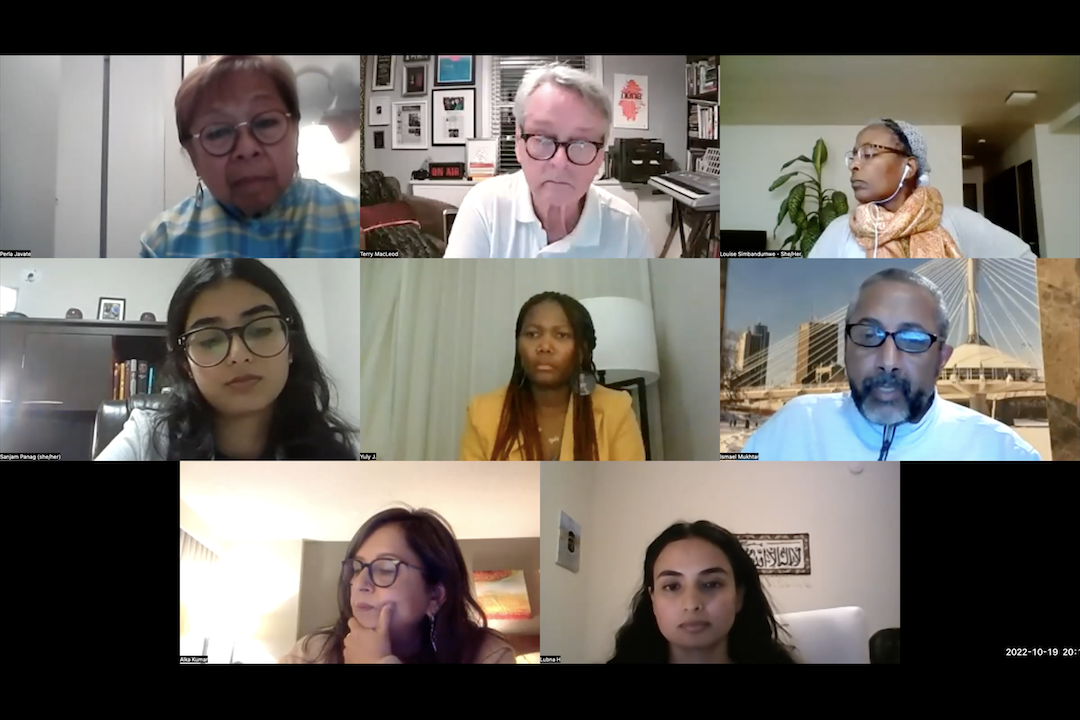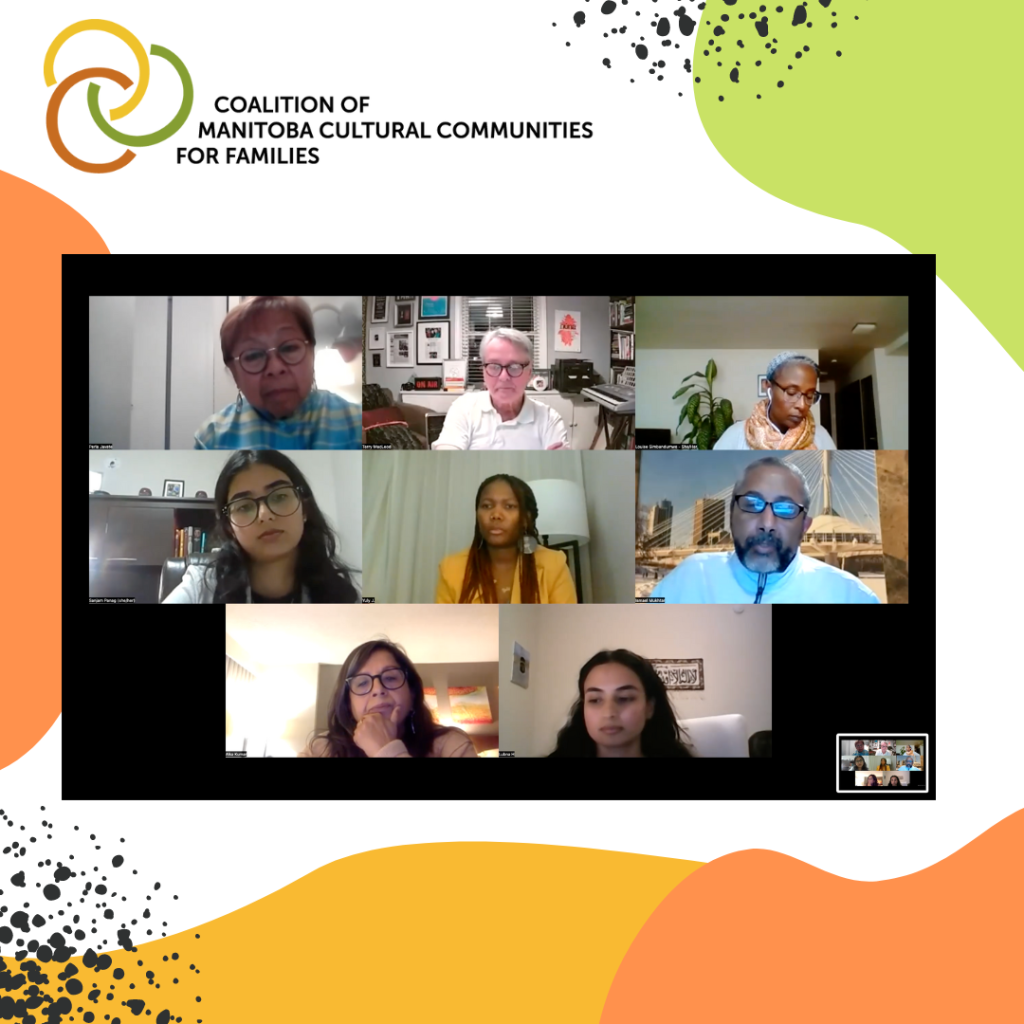
Summary of Our Project Launch
We officially launched our new Intercultural and Intergenerational Diversity and Inclusion Engagement Project, a J.E.D.I. (Justice, Equity, Diversity, and Inclusion) initiative, on October 19, 2022, following our AGM. Below is a summary of the launch, followed by speaker bios and how to learn more about the project.
The panel discussion following our AGM was comprised of four panelists who are committed both to community-based work and to the principles of J.E.D.I.; and they have made remarkable contributions to enhance awareness and capacity building in their communities. They are Louise Simbandumwe, Sanjam Panag, Yuli Johnson, and Ismael Mukhtar.
Terry McLeod and Perla Javate moderated the discussion. Alka Kumar and Lubna Hussein summarized the discussions and provided reflections, and they also included questions and observations from online participants who used the chat function on Zoom to join this important first conversation. (Please find the full biographies of our panel members at the end of the post.)
To kick off the discussion, each of the panelists was asked to situate themselves in relation to J.E.D.I. – what it means to them, and how understanding and applying such a model could help address racism and discrimination in their communities; and this turn leading to better health and well-being outcomes for families and cultural communities.
Louise Simbandumwe
Louise Simbandumwe is the current co-Director of SEED Winnipeg, a former refugee from Burundi, and a passionate activist always working towards strengthening human rights and social justice frameworks for vulnerable groups. In terms of a vision to aspire to, for her J.E.D.I. meant that everyone would be able to achieve their full potential.
On the other end of this spectrum, though, was her deep (and realistic) understanding of socio-economic and structural barriers immigrants, refugees, and newcomers face in Canada (especially based on lived experiences she and her family had in the country during her early years).
Knowing well that precarious immigration status for many individuals, and other limiting factors, like their gender identity, or their race, class, or sexual orientation, often leads to intersectional challenges, for Louise, a capacity building approach, when translated to action steps, integrated inclusion during planning stages.
She shared some of the measures from her own work with communities as examples to make J.E.D.I. actionable:
(a) Creating opportunities for training individuals for tasks continuously needed in a community setting, like supporting refugee claimants fill out their paperwork.
(b) Being there to advocate for building funding infrastructure so members from different newcomer communities could get paid (not just volunteer) for their time for training human rights advocates, and for delivering workshops for awareness and enablement of community members.
(c) Incorporating inclusive measures so that youths of all genders could participate, including being respectful of pronoun usage, so a safe and welcoming environment is created for all.
During the second round of the panel, Louise dug deeper into issues related to racism, not only sharing a little about her advocacy work as an example of action steps, but also highlighting complexities arising from intertwined issues, like fraught relationships between indigenous groups and immigrant communities, and the need for building bridges, and for inter-community solidarities so everyone can feel like they belong.
Sanjam Panag
Sanjam Panag is a dedicated youth leader representing the Punjabi community, and a graduate from the interdisciplinary field of conflict resolution and politics. For her social justice encompasses the three pillars – equity, diversity, and inclusion – all being interconnected and reliant on each other.
Speaking of the components of a social justice agenda, Sanjam indicated these to be: access to information, services and resources; these leading, in turn, to equality of opportunity and meaningful participation of community members in decision making at all levels. J.E.D.I. in practice, as she described it, was for her a means for redressing injustices, and for ensuring that human rights and overall safety and security of individuals, families and communities becomes sustainable.
She situated the current partnership initiative between CMCCF and the Punjabi community in the context of increasing diversity among Canadian population groups; describing its objective as being to better understand existing gaps between the needs of diverse community members and the abilities of service providers to deliver relevant and optimal programming and support.
Sanjam highlighted diversity as an important factor; she referred to the COVID-19 pandemic (still ongoing) as that breaking-point that laid bare inequities and vulnerabilities that exist between racialized and non-racialized population groups.
For instance, these inequities, as well the missing element of cultural competency in information sharing and service delivery in immigrant and newcomer communities, have together led to negative impacts on well-being while exacerbating pre-existing mental health challenges.
Sanjam reiterated the need for these services to be provided in culturally safe ways to the South Asian and other ethnic communities; she also highlighted the difficulties and the need for addressing taboo topics – like mental health and family abuse – in ways that also ensure that beliefs, ethnicities, and diverse perspectives of community members are adequately represented and respected.
Lack of understanding and responsiveness is often missing within service provision, and when this is the case, cultural communities remain resistant to accessing available services. It is in such scenarios that the J.E.D.I. model of collaborating with cultural communities is helpful as it is based in working with community leaders – youth and other interested members – to develop training programs that can help them gain skills that situate facilitation tools and conflict resolution strategies in a culturally responsive context that also aligns with people’s belief systems and personal values.
Sanjam’s vision and plan – in her role as co-chair of the Punjabi Youth Initiative – is to build on lived experiences and community connections to explore actionable measures, like creating a network of Punjabi youth who can reshape approaches and narratives about stigma related topics that lead to harm in community, be it through dialogue, awareness, and education.
The objective that underpins such an aspiration is for youth to contribute towards the well-being of their community at all generational levels, actualizing J.E.D.I. principles by laying the foundation for an intentional community that’s focused on healing, responsibility, and holistic well-being.
One of the cohorts needing special support that Sanjam referred to specifically was international students from the Punjabi community in Manitoba. More generally too- looking at experiences of international students beyond the Indian community, exploitative policies perpetrated by a range of stakeholders, including those propagated by educational institutions, have been increasingly highlighted through current media stories and available data.
Further, Sanjam highlighted several negative outcomes for this cohort that reports, and research have also pointed to, like poor economic outcomes, labour exploitation and human trafficking, as well as internalized racism and growing suicide rates.
Acknowledging internal hierarchical systems that exist within cultural communities, Sanjam movingly spoke also of the need for J.E.D.I. to tackle racial hierarchies internal within the community setting, based not just on race, colour or caste, but also on factors like citizenship status, or time of migration to Canada, or the nature of ties to one’s country of birth.
And so, newer immigrants struggle against internalized racism that they often face within their own cultural communities while battling racism from other communities as well. This issue, while prevalent in the South Asian community, is not unique to it but is pervasive in other ethnic communities as well.
Such an observation is really significant as it highlights an insider perspective of a youth leader trying to understand the different layers of racism her community members encounter (and also help perpetuate on each other and on members of other ethnic communities).
Using J.E.D.I. principles with the objective of working with her community, both to develop coping strategies while also understanding the situation in an in-depth manner, Sanjam’s goal is to collaborate with CMCCF, and to develop with her community peers, solutions that would work in a family and community setting.
Such solutions, she observes, are tools that would help address cultural stigmas and discrimination; others are to work continuously on issues relating to unfamiliarity with services and limitations like inequitable opportunities for members of cultural communities.
Yuli Johnson
Yuli Johnson is a 1.5 generation Canadian, and a former refugee, with a background in Social Work – she works with Manitoba Association for Newcomer Serving Organizations as a Research and Data Coordinator, she describes herself as a proud Black Colombian woman.
She went on to explain that justice for her was about eliminating barriers that vulnerable individuals and groups experience and that without equality there can be no justice. Only when both justice and equality are in place can people perform at their own pace, but resources must be available for diverse individuals and groups.
We need diversity, Yuli added, and inclusion must go hand in hand with it; people of all backgrounds, colours, and socio-economic status must feel represented, feel a sense of belonging through their voices being heard and amplified, and safe spaces existing where they are able to speak.
Using a lived experience lens, she shared incidents where she was bullied in the educational system for being a person of colour, seen not for the unique individual she is but generalized and stereotyped, being seen only in certain respects and not in her fullness; this made her feel excluded, her voice not heard.
While Yuli acknowledged her privilege, being able to speak and belong in this panel through sharing her story, she also cautioned about how far there was to still go to achieve the objectives envisioned by J.E.D.I. Seeing issues arising from being labeled and generalized by virtue of belonging to certain communities and categories as problematic, she discussed racism in the world of hiring and employment.
When hiring people from different backgrounds, it is important to respect them, valuing them as they are, using the concept of J.E.D.I. to make real inclusion actionable instead of just checking a box by way of performative action.
Yuli stressed the need for youth leaders to be role models who can support their communities to deal with and address racism and discrimination so that health and well-being goals of communities can be realized. She advocates for self-reflection to ensure we can continue working on ourselves, as well as recognizing the gifts everyone brings with them.
Ismael Mukhtar
Ismael Mukhtar is an accountant working in the corporate sector, former president of the Manitoba Islamic Association, and as an individual who came to Canada as a refugee-situated himself through a lived experience lens, both as an individual, and also in his role as a representative of the diverse communities of people from more than 50 countries, like Somalia, Afghanistan, Kurdistan, and other global regions.
Starting by noting how timely and critical this discussion on J.E.D.I. was, Ismael noted that there can be no prosperity without social justice. However, given the obvious fact that discrimination and inequalities exist globally, such a scenario clearly indicates that there is an absence of social justice worldwide.
He recounted his own struggles as a refugee, facing discrimination in the process of securing an education and later while seeking employment. Ismael emphasized the need to have such important conversations in spaces where decision making happens, for example, in the corporate world where a lot of hiring decisions are made.
Digging deeper, he explores the dehumanizing impact on the individual when justice and equity are absent from systems, practices, and policy, bringing awareness to the experience of how it feels when an individual is pushed to the margins. Being denied the opportunity to make a positive contribution to society – if this is indeed an individual’s aspiration – can be life-changing for them, he added.
Ismael speaks of Islamophobia too, particularly in the context of diverse groups migrating to Canada; and he observes that instead of finding inclusivity and diversity, equity and social justice -traits they had hoped to find – many often found hate and discrimination.
He went on to add that we need to create a society that is truly inclusive and accepting of other people different from ourselves; and for that to be realized, not only do mindsets need to change but we need to also change the way we look at each other.
Hateful messages circulating on social media are a problematic phenomenon, Ismael said, as they end up shaping people’s ideas and attitudes, as well as their negative perceptions and their hostile behaviours towards each other.
In the Future
Further community conversations are being planned over the next few months that will not only continue our dialogue about J.E.D.I. issues but will also expand our focus to a further discussion of strategies for reducing racism and discrimination and strengthening community health and well-being.

BIOGRAPHIES FOR PROJECT LAUNCH
Panel Members
Louise Simbandumwe is Co-Director at SEED Winnipeg and grassroots community activist. A former refugee, Louise is passionate about human rights and social justice. Her volunteer commitments include, the Immigration Partnership Winnipeg Council, the Immigration Matters in Canada Coalition and the Police Accountability Coalition. She also served on the advisory committee for Manitoba’s poverty reduction strategy and the Ministerial advisory committee for Canada’s first poverty reduction strategy. Louise has a Bachelor in Commerce from the University of Saskatchewan and a Masters in Comparative Social Research from Oxford University. She has developed and taught innovative courses on financial empowerment, community economic development, and human rights advocacy at the University of Winnipeg.
Sanjam Panag is a first-generation Punjabi settler living on Treaty 1 territory. She graduated from the University of Winnipeg in 2021 with a BA in Conflict Resolution Studies and Political Science. Sanjam is dedicated to advocating for conditions that foster inclusivity and equity and forging transformative solutions to multi-dimensional conflicts. A co-founder of the Collective of Voices, Sanjam is actively involved in the community on topics of reconciliation and allyship. She also has experience working in political settings, having worked at a Senator’s office, Ministers’ Regional Offices, and the Manitoba Legislative Assembly. Hoping to pursue a career in law, Sanjam is currently a Senior Research Assistant for the University of Winnipeg and completing the law school admissions process.
Yuly Vanessa Johnson is the Research and Data Coordinator at Manitoba Association for Newcomer Serving Organizations (MANSO). Yuly holds a bachelor’s degree in Social Work from Booth University. As a former refugee, she places refugees and their lived experiences at the centre of her advocacy work, she continues to push policy, program development, service delivery, and decision-making processes to ensure refugees can actively participate and influence the outcome of their hopes and aspirations.
Therefore, Yuly believes strongly in the power of justice, equality, advocacy, and empowerment. Yuly has volunteered in several non-profit organizations in the settlement sector with immigrants and refugees in Winnipeg. In addition to that, Yuly has led different projects, such as women empowerment groups, ethno-cultural dance groups, and English conversation clubs, in both Winnipeg – Canada, and back home, Buenaventura – Colombia
Ismael Ibrahim Mukhtar has been one of the key leaders of the Manitoba Muslim community for over three decades. His extensive and wide-ranging community contributions include serving as president of the Manitoba Islamic Association, vice-president of the Muslim Student Association, editor-in-chief of the Manitoba Muslim Magazine, volunteer imam, and counsellor.
Conversation Animators
Terry MacLeod is an independent Emmy-nominated journalist and recipient of The Queen’s Diamond Jubilee Medal. He worked 33 years with CBC, 23 years of which were in Winnipeg where he hosted “Information Radio” and was host/producer of “The Weekend Morning Show”. He has been a producer and guest-host on CBC’s hit radio show “Morningside” with Peter Gzowski where he produced Stuart McLean. He was a regular guest on CBC TV’s “Midday”. He started with CBC in Thunder Bay and has guest-hosted CBC Toronto’s “Metro Morning”, “Morningside in the Summer”, “Sounds Like Canada”, “As It Happens”, “The Story From Here”, and on BBC Radio Scotland.
Terry has worked in indigenous radio for The WaWaTa Communications Society in NWOntario and Taqramiut Nipingat radio network in Nunavik. In Thunder Bay Ont he performed and wrote with Kam Theatre Lab, was exec director of Monitor North – an experimental television centre and was a social worker.
Terry has served as a judge for: The Canadian Assoc of Journalists, The Winnipeg Theatre Awards and The Reel Pride Film Festival. He currently serves on the board of The Gimli Film Festival. He was a participant in Leadership Winnipeg and served on the faculty of The Winnipeg-based Canadian Muslim Leadership Institute Terry holds a Bachelor of Arts in Psychology.
Perla Javate was a social worker by profession. She is now a retired Community Liaison Officer/Intercultural Support Worker from Winnipeg School Division where she served for 34 years. She worked with Filipino and other newcomer students and their families, helping them navigate the school system and providing support to the schools’ administration and teachers to understand students, the school system they came from and their culture and heritage.
She is currently President of the Philippine Heritage Council of MB Inc., Co-chair of the Ethnocultural Council of MB, President of the Coalition of Filipino Canadians for Stronger Families and Founder and Past President of Pinays MB Inc.
Reflectors
Alka Kumar (PhD) is an educator with a passion for ongoing learning. She views sees herself as a `pracademic,’ given she has equal interest in research and practice; and through her work her objective is to bridge these two worlds that are often quite separate from each other.
While Alka has several years of experience in teaching English and Literary Studies, her work in the last few years has been in Migration and Labour Market integration, specifically as it relates to racialized communities. Carrying her own `lived experience’ of migration, her areas of expertise include skills and training workshop facilitation; and supporting new Canadians and other individuals in building capacity through individualised career transition and employment pathways planning. Alka develops resources for and she teaches professional practices to job seekers, new employees and to staff. These include areas like e-Communication and Business Writing, Conflict Management, and narrative techniques involving storytelling to help program participants in achieving their self-improvement goals, and to prepare them for workplace success. Additionally, Alka loves to engage groups in community-based settings, undertaking projects that involve research, writing, workshop facilitation, and stakeholder engagement.
Lubna Hussein’s shared passion for community service and mental health prompted her to create a podcast “Desi me Healin.” Where she discusses cultural stigmas, mental wellness, healing and spirituality. In 2014 Lubna moved from Chicago, IL. Her educational background is BA in cultural anthropology from DePaul University. With over 7 years working for community services, her passion and purpose lies in bridging the gaps by building bridges to deepen human connection within the community.
Find Out More
To learn more about our Intercultural and Intergenerational Diversity and Inclusion Engagement Project, go to our J.E.D.I. Initiative landing page here. To get involved with this or any of our other projects, activities and initiatives, fill out our contact form here or email us at hello@cmccfamilies.ca
This project is funded by:



 Next Post
Next Post